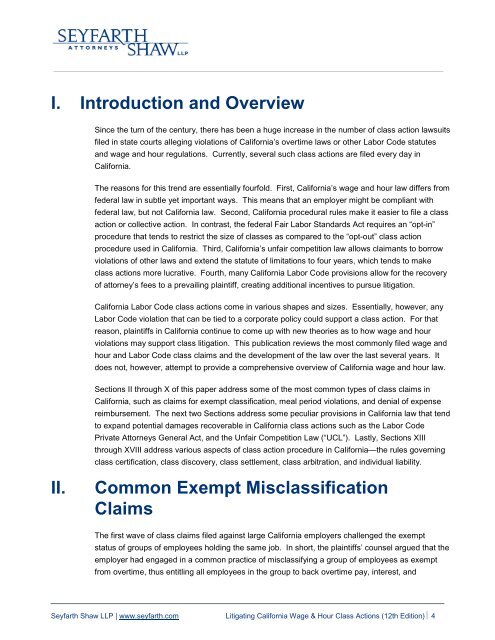Litigating California Wage & Hour and Labor Code Class Actions
Litigating California Wage & Hour and Labor Code Class Actions
Litigating California Wage & Hour and Labor Code Class Actions
You also want an ePaper? Increase the reach of your titles
YUMPU automatically turns print PDFs into web optimized ePapers that Google loves.
I. Introduction <strong>and</strong> Overview<br />
Since the turn of the century, there has been a huge increase in the number of class action lawsuits<br />
filed in state courts alleging violations of <strong>California</strong>’s overtime laws or other <strong>Labor</strong> <strong>Code</strong> statutes<br />
<strong>and</strong> wage <strong>and</strong> hour regulations. Currently, several such class actions are filed every day in<br />
<strong>California</strong>.<br />
The reasons for this trend are essentially fourfold. First, <strong>California</strong>’s wage <strong>and</strong> hour law differs from<br />
federal law in subtle yet important ways. This means that an employer might be compliant with<br />
federal law, but not <strong>California</strong> law. Second, <strong>California</strong> procedural rules make it easier to file a class<br />
action or collective action. In contrast, the federal Fair <strong>Labor</strong> St<strong>and</strong>ards Act requires an “opt-in”<br />
procedure that tends to restrict the size of classes as compared to the “opt-out” class action<br />
procedure used in <strong>California</strong>. Third, <strong>California</strong>’s unfair competition law allows claimants to borrow<br />
violations of other laws <strong>and</strong> extend the statute of limitations to four years, which tends to make<br />
class actions more lucrative. Fourth, many <strong>California</strong> <strong>Labor</strong> <strong>Code</strong> provisions allow for the recovery<br />
of attorney’s fees to a prevailing plaintiff, creating additional incentives to pursue litigation.<br />
<strong>California</strong> <strong>Labor</strong> <strong>Code</strong> class actions come in various shapes <strong>and</strong> sizes. Essentially, however, any<br />
<strong>Labor</strong> <strong>Code</strong> violation that can be tied to a corporate policy could support a class action. For that<br />
reason, plaintiffs in <strong>California</strong> continue to come up with new theories as to how wage <strong>and</strong> hour<br />
violations may support class litigation. This publication reviews the most commonly filed wage <strong>and</strong><br />
hour <strong>and</strong> <strong>Labor</strong> <strong>Code</strong> class claims <strong>and</strong> the development of the law over the last several years. It<br />
does not, however, attempt to provide a comprehensive overview of <strong>California</strong> wage <strong>and</strong> hour law.<br />
Sections II through X of this paper address some of the most common types of class claims in<br />
<strong>California</strong>, such as claims for exempt classification, meal period violations, <strong>and</strong> denial of expense<br />
reimbursement. The next two Sections address some peculiar provisions in <strong>California</strong> law that tend<br />
to exp<strong>and</strong> potential damages recoverable in <strong>California</strong> class actions such as the <strong>Labor</strong> <strong>Code</strong><br />
Private Attorneys General Act, <strong>and</strong> the Unfair Competition Law (“UCL”). Lastly, Sections XIII<br />
through XVIII address various aspects of class action procedure in <strong>California</strong>—the rules governing<br />
class certification, class discovery, class settlement, class arbitration, <strong>and</strong> individual liability.<br />
II.<br />
Common Exempt Misclassification<br />
Claims<br />
The first wave of class claims filed against large <strong>California</strong> employers challenged the exempt<br />
status of groups of employees holding the same job. In short, the plaintiffs’ counsel argued that the<br />
employer had engaged in a common practice of misclassifying a group of employees as exempt<br />
from overtime, thus entitling all employees in the group to back overtime pay, interest, <strong>and</strong><br />
Seyfarth Shaw LLP | www.seyfarth.com <strong>Litigating</strong> <strong>California</strong> <strong>Wage</strong> & <strong>Hour</strong> <strong>Class</strong> <strong>Actions</strong> (12th Edition) 4
















